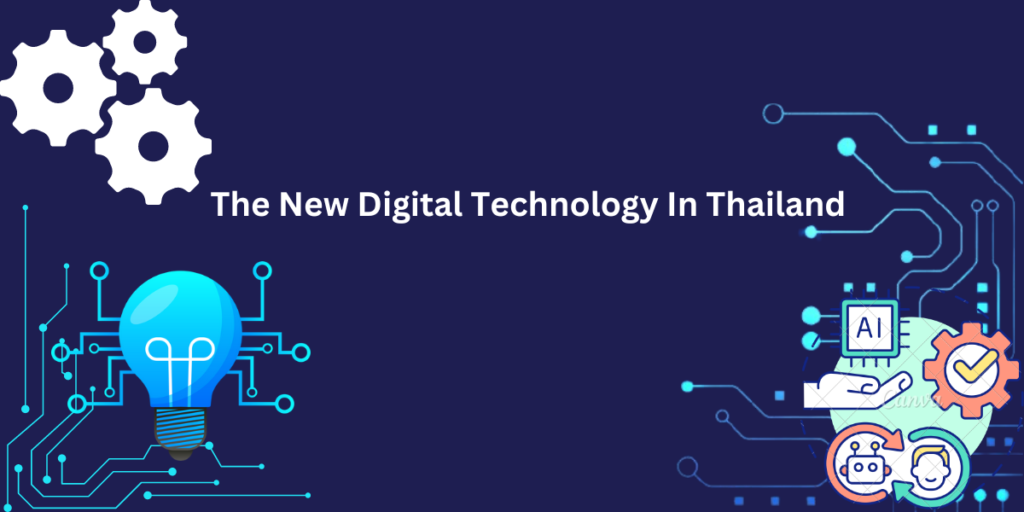In today’s rapidly advancing world, digital technology is at the forefront of change, revolutionizing industries and transforming societies. Thailand is no exception to this trend. This blog will show you about the new digital technology in Thailand, exploring how the country is embracing innovation to drive economic growth, improve public services, and enhance the quality of life for its citizens. From the rise of e-commerce to the development of smart cities, Thailand’s digital transformation is a story worth telling.
Table of Contents
Thailand’s Digital Economy: A New Era of Growth
This blog will show you about the new digital technology in Thailand, particularly focusing on the nation’s burgeoning digital economy. Thailand’s digital economy is growing at an unprecedented rate, driven by a combination of government initiatives, private sector innovation, and consumer demand. The Thailand 4.0 policy, launched by the government, aims to transition the country from an industry-based economy to a digital and innovation-based economy. This ambitious plan places a strong emphasis on digital technology as a key driver of economic growth.
One of the most visible aspects of this digital transformation is the rise of e-commerce. With a population that is increasingly connected to the internet, online shopping has become a major part of everyday life in Thailand. Companies like Lazada, Shopee, and JD Central have become household names, offering a wide range of products and services at the click of a button. This blog will show you about the new digital technology in Thailand by examining how these e-commerce platforms are utilizing advanced technologies like artificial intelligence (AI) and big data to enhance the shopping experience and streamline operations.

Fintech Revolution: Changing the Way Thais Handle Money
This blog will show you about the new digital technology in Thailand’s financial sector, where fintech innovations are reshaping the way people manage their finances. Fintech, or financial technology, refers to the use of technology to improve and automate financial services. In Thailand, fintech is booming, with startups and established financial institutions alike embracing digital solutions to meet the needs of a tech-savvy population.
Digital wallets, mobile banking, and blockchain technology are just a few examples of how fintech is transforming the financial landscape in Thailand. TrueMoney, Rabbit LINE Pay, and other digital wallet services have made it easier than ever for Thais to make payments, transfer money, and manage their finances on the go. This blog will show you about the new digital technology in Thailand by highlighting the role of these digital payment systems in promoting financial inclusion and reducing the reliance on cash transactions.
Furthermore, the Bank of Thailand has been proactive in creating a regulatory environment that encourages innovation while ensuring the stability and security of the financial system. This blog will show you about the new digital technology in Thailand by discussing how the central bank’s support for fintech is positioning the country as a leader in the digital finance sector within Southeast Asia.
Smart Cities: The Future of Urban Living
As urbanization continues to accelerate, cities around the world are turning to digital technology to address the challenges of urban living. This blog will show you about the new digital technology in Thailand’s smart city initiatives, which are transforming the way cities operate and how residents interact with their urban environments.
Bangkok, Thailand’s bustling capital, is at the forefront of the country’s smart city movement. This blog will show you about the new digital technology in Thailand by exploring how Bangkok is implementing smart solutions to improve traffic management, enhance public safety, and promote sustainability. For example, the city is deploying smart traffic lights that use real-time data to optimize traffic flow and reduce congestion, a critical issue in a city known for its traffic jams.
In addition to smart traffic systems, Bangkok is also investing in smart energy solutions, such as smart grids and renewable energy sources, to reduce its carbon footprint and ensure a reliable supply of electricity. This blog will show you about the new digital technology in Thailand by examining how these smart energy initiatives are contributing to the country’s broader sustainability goals.
Beyond Bangkok, other cities in Thailand are also embracing the smart city concept. Chiang Mai, Phuket, and Khon Kaen are among the cities that have launched smart city projects, focusing on areas such as public transportation, waste management, and healthcare. This blog will show you about the new digital technology in Thailand by highlighting the innovative approaches these cities are taking to improve the quality of life for their residents.
The Role of 5G in Thailand’s Digital Transformation
This blog will show you about the new digital technology in Thailand by discussing the role of 5G, the next generation of mobile network technology, in driving the country’s digital transformation. 5G offers significantly faster data speeds, lower latency, and the ability to connect a massive number of devices simultaneously, making it a key enabler of new digital technologies.
In Thailand, the rollout of 5G is already underway, with major telecom companies like AIS, TrueMove H, and dtac leading the charge. This blog will show you about the new digital technology in Thailand by exploring how 5G is expected to impact various sectors, including healthcare, manufacturing, and transportation.
For instance, 5G is expected to revolutionize healthcare in Thailand by enabling telemedicine, remote surgery, and real-time health monitoring. This blog will show you about the new digital technology in Thailand by examining how 5G will allow doctors to diagnose and treat patients remotely, reducing the need for travel and making healthcare more accessible, especially in rural areas.
In the manufacturing sector, 5G will enable the deployment of smart factories, where machines and systems are connected and communicate with each other in real time. This blog will show you about the new digital technology in Thailand by discussing how smart factories will improve efficiency, reduce costs, and enhance the competitiveness of Thai manufacturers on the global stage.
Digital Education: Preparing the Next Generation
This blog will show you about the new digital technology in Thailand’s education sector, where digital tools and platforms are transforming the way students learn. The COVID-19 pandemic accelerated the adoption of digital education in Thailand, as schools and universities were forced to shift to online learning. This shift has had a lasting impact, with many educational institutions continuing to use digital tools to enhance teaching and learning even after returning to in-person classes.
Digital technology is enabling new approaches to education in Thailand, from online courses and virtual classrooms to AI-driven personalized learning. This blog will show you about the new digital technology in Thailand by exploring how these tools are helping students develop the skills they need to succeed in a digital world.
Moreover, the Thai government is actively promoting digital literacy and STEM (science, technology, engineering, and mathematics) education to prepare the next generation for the demands of the digital economy. This blog will show you about the new digital technology in Thailand by highlighting the government’s initiatives to integrate digital skills into the national curriculum and provide students with the resources they need to thrive in a technology-driven future.

E-Government: Enhancing Public Services
This blog will show you about the new digital technology in Thailand’s public sector, where e-government initiatives are improving the efficiency and accessibility of public services. E-government refers to the use of digital technology to deliver government services and interact with citizens. In Thailand, the government is leveraging digital tools to streamline administrative processes, reduce bureaucracy, and make it easier for citizens to access services.
For example, the Thai government has launched several online portals where citizens can apply for permits, pay taxes, and access other government services without having to visit a government office in person. This blog will show you about the new digital technology in Thailand by examining how these e-government platforms are making public services more convenient and efficient.
In addition to improving service delivery, e-government initiatives are also enhancing transparency and accountability in Thailand’s public sector. This blog will show you about the new digital technology in Thailand by discussing how digital platforms are enabling greater citizen participation in government decision-making and providing new tools for monitoring and reporting corruption.
The Impact of Digital Technology on Thailand’s Tourism Industry
Thailand is one of the world’s top tourist destinations, known for its beautiful beaches, rich culture, and vibrant cities. This blog will show you about the new digital technology in Thailand’s tourism industry, where digital tools are enhancing the visitor experience and helping the industry recover from the impact of the COVID-19 pandemic.
Digital technology is playing a crucial role in the promotion and management of tourism in Thailand. From virtual tours and online booking platforms to AI-powered chatbots that assist tourists with travel information, digital tools are making it easier for visitors to plan and enjoy their trips to Thailand. This blog will show you about the new digital technology in Thailand by exploring how these innovations are attracting more tourists and boosting the economy.
Moreover, the Thai government is leveraging digital technology to promote sustainable tourism. This blog will show you about the new digital technology in Thailand by highlighting initiatives such as digital platforms that connect tourists with eco-friendly accommodations and activities, as well as mobile apps that provide information on how to minimize environmental impact while traveling.
Challenges Facing Thailand’s Digital Transformation
While Thailand’s digital transformation is progressing rapidly, it is not without its challenges. This blog will show you about the new digital technology in Thailand by addressing some of the key obstacles that the country faces in fully realizing its digital potential.
One of the main challenges is the digital divide, which refers to the gap between those who have access to digital technology and those who do not. In Thailand, this divide is particularly pronounced between urban and rural areas. While major cities like Bangkok have advanced digital infrastructure, many rural areas still lack reliable internet access. This blog will show you about the new digital technology in Thailand by discussing efforts to bridge this gap, such as government programs to expand broadband coverage and provide digital literacy training in rural communities.
Cybersecurity is another significant challenge for Thailand as it becomes more reliant on digital technology. This blog will show you about the new digital technology in Thailand by exploring the measures that the government and private sector are taking to protect against cyber threats, including the development of a national cybersecurity strategy and the establishment of cybersecurity training programs.
Finally, there is the challenge of ensuring that all sectors of society benefit from digital transformation. This blog will show you about the new digital technology in Thailand by highlighting the importance of inclusive digital policies that address the needs of marginalized groups, such as the elderly, people with disabilities, and those with limited access to education.
Conclusion
This blog will show you about the new digital technology in Thailand, providing a comprehensive overview of how the country is embracing innovation to drive economic growth, improve public services, and enhance the quality of life for its citizens. From the rise of e-commerce and fintech to the development of smart cities and digital education, Thailand is at the forefront of digital transformation in Southeast Asia.
However, as Thailand continues on its digital journey, it must also address the challenges that come with it, such as the digital divide, cybersecurity threats, and the need for inclusive policies. By overcoming these challenges, Thailand can fully realize the potential of digital technology to create a more prosperous and equitable society.
As you explore the various aspects of Thailand’s digital transformation in this blog, it becomes clear that the future of the country is closely tied to its ability to harness the power of digital technology. This blog will show you about the new digital technology in Thailand, offering insights into the exciting developments that are shaping the nation’s future and the opportunities they present for businesses, residents, and the global community.

FAQs
1. What is the focus of digital technology advancements in Thailand?
This blog will show you about the new digital technology in Thailand, focusing on areas such as the digital economy, fintech, smart cities, and digital education. These advancements are driving economic growth, improving public services, and enhancing the quality of life in the country.
2. How is Thailand’s government supporting digital technology?
The Thai government supports digital technology through initiatives like the Thailand 4.0 policy, which aims to transition the economy from industry-based to innovation-driven. The government also promotes digital literacy, 5G rollout, and smart city projects to ensure the country’s digital transformation.
3. What role does 5G play in Thailand’s digital transformation?
5G technology is crucial in Thailand’s digital transformation, enabling faster data speeds, lower latency, and enhanced connectivity. It impacts various sectors, including healthcare, manufacturing, and transportation, by supporting innovations like telemedicine, smart factories, and autonomous vehicles.

